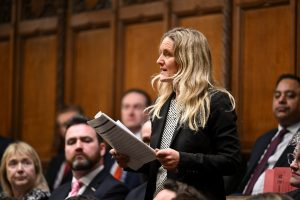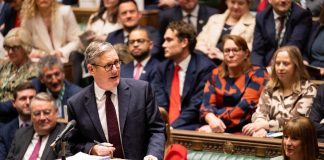The House of Commons today voted to pass the controversial Terminally Ill End of Life bill, a motion which will allow the terminally ill to choose medical assistance to end their lives. The vote passed by a majority of just 23, after lengthy debate throughout the morning.

The bill, which was put forward by the Labour MP for Spen Valley, Kim Leadbeater, will allow terminally ill patients to choose to end their lives, provided they have only 6 months to live and this has been approved by two doctor’s, as well as a panel including a social worker, a senior legal figure, and a psychiatrist.
The bill has been met with a great deal of scrutiny since first being proposed by Leadbetter in the wake of the 2024 election. It comes off the back of a long running debate around voluntary euthanasia for the terminally ill, which has always been outlawed in the UK, but has been made legal in countries such as the Netherlands, Belgium and Canada.
Whilst proponents argue that the current law only served to prolong the suffering of people who are already facing death, critics have warned that any medical assistance for patients choosing to die would be a slippery slope that puts the most vulnerable in society at risk of an unnecessary and premature death.
Many MPs and campaigners have raised the concern that those facing terminal illness may feel like a burden to others or otherwise be pressured into ending their lives; given the current state of palliative care across the country, as well as a rise in inequality, mental health conditions, and costs of living.
This was the second reading for the bill after an initial vote in November of last year. Changes to the bill during today’s debates has mean additional safeguards have been added to the legislation, including a continued ban on Assisted Dying for those voluntarily refraining from eating and drinking, as well as a review of current palliative care pencilled in for within a year prior to the law’s implementation.
These changes were added to the bill by Leadbeater in an attempt to address some of the concerns raised around the bill. However, they stop short of the additional amendments been proposed by critics, such as a ban on access for those suffering from mental health problems, and a clause to ensure NHS care does not shift from saving life.
Given the nature of this bill, MPs were allowed to vote with their own conscience, rather than following a party line. As such, the debate saw a wide range of opinion from all sides of the house, with some Labour MPs and members of the Cabinet choosing to vote against the bill, as well as some from the Opposition voting for it. Numerous MPs have also changed sides over the course of the debate.
Prime Minister Keir Starmer and former PM Rishi Sunak voted in favour of the bill, whilst Deputy Prime Minister Angela Rayner and Opposition leader Kemi Badenoch both voted against. MPs from the Bradford and Kirklees area were overwhelmingly amongst those voting against the bill.
Imran Hussain, the Labour MP for Bradford East, and Anna Dixon, Labour MP for Shipley, both stated prior that they would be voting against.
‘I have no principled objections to assisted dying,” Dixon stated. “However, as someone with nearly 30 years of experience in health and care, I believe that the bill presented to us is both unworkable and unsafe.’
This was echoed by Naz Shah, the Labour MP for Bradford West, who spoke out in Parliament today about the impact this may have on the most vulnerable. “I came to this bill with an open mind,” she stated. “In principle, I supported it. Our responsibility is to make sure this bill is safe, workable, and effective. But as this bill stands, it is a public safety issue. What is the margin of error when it comes to something as serious as death, that we are willing to risk today?
Robbie Moore, the Conservative MP for Keighley and Ilkley, and Iqbal Mohammed, the Independent MP for Dewsbury, were also amongst those voting against the bill, Mohammed arguing that the current state of palliative care means there will be no real choice offered by the bill.
The vote passed with 314 votes in favour and 291 against. It will now go to the House of Lords before it can become law. Generally, the House of Lords backs votes by the Commons, however campaigners against the bill remain hopeful of seeing it overturned.




